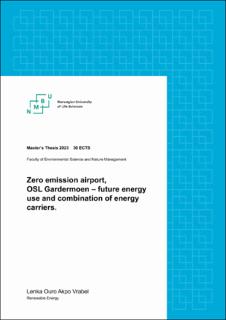Zero emission airport, OSL Gardermoen – future energy use and combination of energy carriers.
Master thesis
Permanent lenke
https://hdl.handle.net/11250/3125913Utgivelsesdato
2023Metadata
Vis full innførselSamlinger
- Master’s theses (MINA) [668]
Sammendrag
In the last decades, the entire world has been grappling with climate change challenges. The main reason for climate change is increased concentration of greenhouse gases in the atmosphere, caused by burning fossil fuels. The aviation is also responsible for increasing global CO2 emissions. The most discussed solution to emission reduction in recent years is electrification. However, will this solution lead to increased electricity demand? Hence, we decided to examine three scenarios on the case study of OSL Gardermoen, that may represent a solution in the future. The first scenario includes domestic electric aviation on four routes (Stavanger, Bergen, Kristiansand, Trondheim), while second scenario focuses on single hybrid aircraft route to Bodø. The third scenario explores the hydrogen aircraft solution for international flights.
The total future electricity demand of OSL Gardermoen was modelled for all three scenarios based on calculations of: charging pattern of electrified ground services; charging pattern of electric aircrafts, hybrid aircraft and hydrogen aircraft; flight schedules and number of passenger seats.
Scenario I resulted in an increase of 132 GWh, which represents 112% yearly rise in electricity demand at OSL Gardermoen
The yearly electricity demand in Scenario II increases by 158.29 GWh/year, which represents increase of 130% compared to actual electricity consumption.
Scenario III resulted in yearly increase of 421,53 GWh. When all three scenarios are combined, the annual electricity demand of OSL Gardermoen increases by 558,22 GWh/year, which represents increase of 459% compared to actual electricity consumption.
In conclusion, while electrification combined with hybrid solutions shows promise in reducing emissions and noise pollution in aviation, the challenges of managing increased electricity demand, technological uncertainties, and the need for broader infrastructure improvements remain significant areas for further research and exploration in the pursuit for sustainable aviation solutions.
